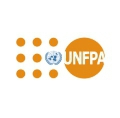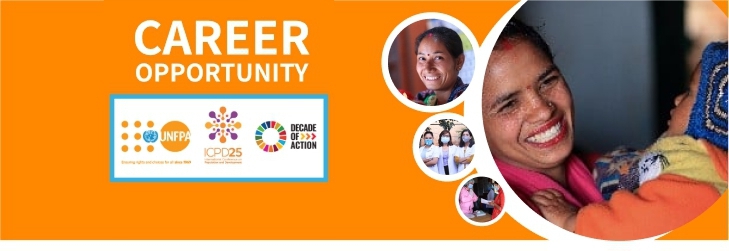


UNFPA, the United Nations Population Fund, is a voluntary-funded international organization with a presence in over 150 countries, including Nepal. UNFPA is guided by the Programme of Action of the 1994 Cairo International Conference on Population and Development (ICPD) and the Sustainable Development Goals. Its mission is to ensure that every pregnancy is wanted, every childbirth is safe and every young person’s potential is fulfilled.
The work of UNFPA is based on the premise that all human beings are entitled to equal rights and protections. We focus on women and young people because these are groups whose ability to exercise their right to sexual and reproductive health is often compromised. Our work is informed by an understanding of population dynamics, human rights and cultural sensitivity.
UNFPA in Nepal
UNFPA support to Nepal began in 1971 and has evolved in response to the changing national contexts. The new country programme is aligned to national priorities, the 2030 Agenda for Sustainable Development, the ICPD Programme of Action, the Convention on the Elimination of All Forms of Discrimination against Women, the UNFPA strategic plan, 2022–2025, and the UNSDCF, 2023–2027. The programme aims to contribute to and accelerate achievement of the 2030 Agenda, in particular SDGs 3 and 5 and the three UNFPA transformative results, in line with the Decade of Action.
UNFPA partners with the Government of Nepal, youth and women’s organizations and development partners to advance its mission. Under the 9th Country Programme and in line with its mandate, UNFPA Nepal is working around the following areas:
Sexual and reproductive health and rights: UNFPA is supporting national efforts in Nepal to improve the sexual and reproductive health of the most marginalized adolescent girls and women. The Fund is largely focusing on youth aged 15-24 and the most marginalized women addressing both the demand and supply sides of reproductive health services to improve access to information and services on maternal health, family planning, and sexually transmitted infections, including HIV.
Gender equality, Gender-based violence and Harmful Practices : UNFPA’s support to the Government of Nepal under this overarching theme seeks to ensure that vulnerable groups experience greater self-confidence, respect and dignity. We are building national capacity in the health sector to address gender-based violence (GBV), prevent child marriage and other harmful practices, and working to enhance the knowledge and capacity of men, women and communities to GBV. Investing in young people, especially the vulnerable and the marginalized, is a priority for UNFPA Nepal. The country has a large adolescent and youth population. Nepal is experiencing a demographic window of opportunity, a ‘youth bulge’. Nepali youth face several development challenges, including access to education, employment, gender inequality, child marriage, youth-friendly health services and adolescent pregnancy. Yet, with investments in their participation and leadership, young people can transform the social and economic fortunes of the country. UNFPA Nepal works with the government and partners to advocate for adolescents and youth’s rights and investments, including education, livelihood skills and health, including sexual and reproductive health.
Disaster risk reduction and climate change: UNFPA is working on environmental sustainability, climate and disaster resilience, with a focus on ensuring that the specific needs and rights of women and girls, particularly those from vulnerable and marginalized groups, are addressed in humanitarian preparedness, adaptation, response, and recovery efforts.
Population dynamics: Population megatrends at the national and sub-national levels in Nepal continued rapid population growth, population aging, urbanization and migration — not only frame the entire development debate, they demand a reconsideration and re-conceptualization of what will be the main challenges for a new Nepal. Without an adequate understanding of how Nepal is changing from a demographic perspective, forward-looking planning and agenda setting will be of little value. Keeping this in mind, UNFPA Nepal is working with the government to ensure that national, sectoral and decentralized policies and plans address population dynamics and the interlinkages with gender equality, poverty reduction, the needs of young people, and reproductive health, including family planning.
UNFPA, the United Nations Population Fund, is a voluntary-funded international organization with a presence in over 150 countries, including Nepal. UNFPA is guided by the Programme of Action of the 1994 Cairo International Conference on Population and Development (ICPD) and the Sustainable Development Goals. Its mission is to ensure that every pregnancy is wanted, every childbirth is safe and every young person’s potential …
Views: 3427 | This job is expired 2 years ago
Job title: Provincial Programme Analyst, GBV (1 position)
Level: NOB (ICS-9)
Position Number: 203531
Location: Province 1 (Biratnagar duty station)
Full/Part time: Full-Time
Fixed term/Temporary: Temporary
Rotational/Non Rotational: Non Rotational
Job Category: Gender Equality & Human Rights
Duration: 364 days
Apply Before: 08/18/2023, 05:30 PM NPT
The Position:
Under the overall guidance and the direct supervision of the Programme Specialist, GBV based in Kathmandu, the Provincial Programme Analyst GBV is located in Province 1. The incumbent will substantively contribute to the effective implementation of the second phase of the GBV Prevention and Response Project activities in the outlined provinces.
Job Purpose:
Advancing gender equality and promoting the empowerment of women are key priorities in the UNFPA Strategic Plan 2022-2025. UNFPA is a leading player in Gender-Based Violence prevention and response in Nepal. The Country Office manages a portfolio of Gender-Based Violence (GBV) programmes, focused both on multi-sectoral essential services and on prevention. This includes its flagship GBV Prevention and Response (GBVPR) project, jointly funded by the Governments of Norway and Switzerland. Evaluations and reviews have shown positive results from the first phase of the project, and there is scope to consolidate and further expand the GBV portfolio through a second phase of the project. This position is intended to assist the country office in managing the second phase of the GBVPR project as well as to further enhance and grow UNFPA Nepal’s programmatic and thought leadership in this area.
Qualifications and Experience
Education:
Advanced University degree in Women’s or Gender Studies, Public Administration, development studies, social work, human rights or other social sciences, public/community health, law as it relates to gender and GBV, and development or related field;
Knowledge and Experience:
Languages:
Fluency in English and Nepali is required. Working knowledge of another UN language an asset.
This job has expired.









